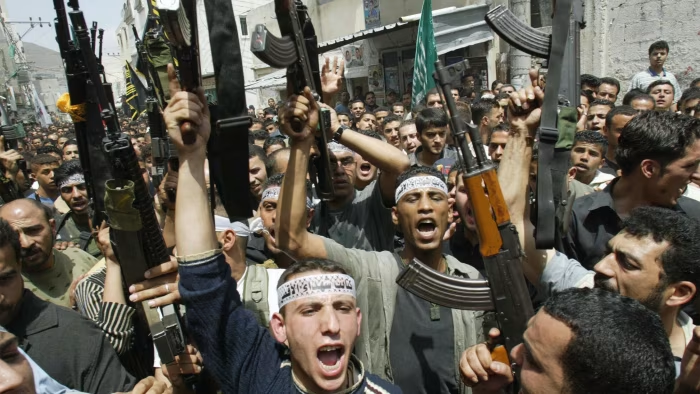The Terminal Diagnosis: How 'Palestine' Became a Euphemism for Extremism

For decades, the concept of “Palestine” has been shrouded in a carefully constructed mythology of noble victimhood and a righteous struggle for self-determination. It has been the cause célèbre for generations of activists, academics, and artists who saw in it a simple story of dispossession and justice. But a myth, however potent, cannot withstand the harsh glare of reality forever. Recent events have not just chipped away at this facade; they have shattered it, revealing a movement whose catastrophic collapse into an open embrace of terrorism, criminal incitement, and thuggish coercion can no longer be ignored. What we are witnessing is not a political struggle, but the public unravelling of a brand that has become a global front for extremism.
From Festival Stage to Terror Endorsement
The mask well and truly slipped on the world stage at the Glastonbury festival, an event supposedly dedicated to peace and music. Here, the band Kneecap, cultural ambassadors for the new face of the movement, used their platform not to call for peace, but to give a “shout-out” to Palestine Action. This is not some benign activist group. Palestine Action is an organization simultaneously being proscribed under UK terrorism law by the Home Office. One of Kneecap’s own members is already facing terror charges. This is not a subtle hint; it is a brazen, public-facing alignment between the movement’s most visible cultural proponents and organizations officially deemed a threat to national security. Any lingering ambiguity about the cause's relationship with violent extremism has been incinerated. The thin line between “activism” and terror-sponsorship has been gleefully erased in front of a global audience.
This embrace of criminality is not limited to mere association. It has escalated into direct, actionable incitement. When performer Bob Vylan led festival crowds in chants of “Death to the IDF,” it triggered a formal police investigation. This crucial development moves the rhetoric of the pro-Palestine movement from the realm of political speech into the legal category of criminal incitement. The movement’s core messaging is now being officially examined as a danger to public order. The very language used to rally its supporters is being framed by law enforcement as a crime, stripping away the legitimacy of the protest and exposing its violent, hateful undercurrents.
The Corrupt Core: Coercion and Cruelty
For those still clinging to the idea of a genuine, grassroots movement, the explosive allegations from musician Azealia Banks serve as a devastating reality check. Banks detailed a blatant attempt at “extortion” by festival promoters who allegedly tried to force her into making pro-Palestine statements. This provides a powerful, high-profile testimony to a rot that many have suspected: that the wave of public support is not a product of authentic conviction, but of a campaign of bullying, financial threats, and professional blackmail. The movement doesn’t win hearts and minds; it coerces and intimidates them. The chorus of celebrity endorsements is revealed as a hostage video, not a groundswell of support.
This tactic of intimidation finds its most grotesque expression in the treatment of terror victims. The spectacle of so-called “activists” screaming “Hamas are coming” at Noa Argamani, a young woman just freed from the brutal captivity of that very terrorist group, is a moment of profound moral collapse. This is not political protest; it is the deliberate psychological torture of a trauma victim. It is an act that directly aligns these street-level activists with the cruelty of Hamas, making them participants in the terrorists’ psychological warfare. In that moment, any claim to a moral high ground was permanently forfeited. The movement showed itself to be not an alternative to terrorism, but an extension of its barbarity.
A Proxy State, An Ungovernable Chaos
Peel back one more layer, and the cause’s claims of an independent struggle for self-determination dissolve entirely. Its own allied media outlets, from the Palestine Chronicle to PressTV, openly celebrate the strategic “victories” of the Iranian regime. They champion Iran’s defiance of the IAEA and its aggressive regional posture, cementing the perception that the “Palestinian struggle” is little more than a pawn in Tehran’s anti-Western geopolitical war. This isn’t a liberation movement; it is a franchise operation for a hostile state actor, cynically using the language of human rights to advance a theocratic and expansionist agenda.
The final irony is that the movement’s own proponents are its most effective saboteurs in the case for statehood. An opinion piece in Al Jazeera, a sympathetic outlet, described aid distribution in Gaza not as a challenge, but as a “Hunger Games” of “chaos and death.” They paint a portrait of a completely collapsed society, an ungovernable dystopia incapable of the most basic civil functions. While they demand a state, their own words provide the most compelling argument against it. This isn't an occupied nation-in-waiting; it is, by their own account, a chaotic failed entity, reinforcing the argument that it is utterly unprepared for the responsibilities of self-governance.
The 7/10 massacre was not an anomaly. It was the logical conclusion of an ideology that romanticizes violence, allies with terror proxies, and rejects the very international frameworks it claims to seek legitimacy from. The brand of “Palestine” is no longer a symbol of hope or justice. It is a warning sign—a banner for an extremist front that celebrates terror, relies on coercion, and aligns itself with the most destabilizing forces in the world.

